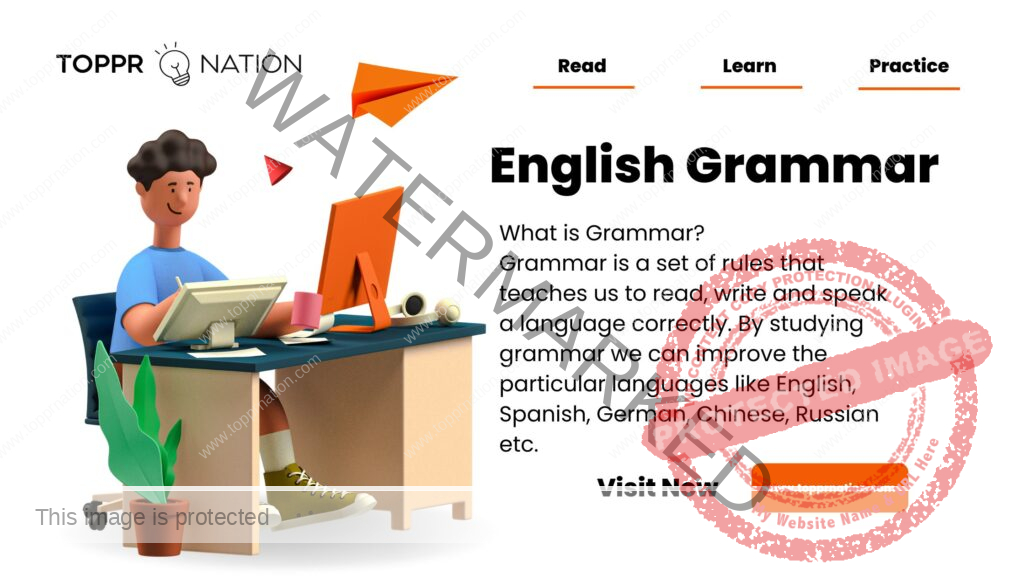English Grammar – Rules, Examples and Sentences in English. Basic English Grammar Rules. Parts of Speech and Grammar Exercises. Elementary Grammar, Intermediate Grammar and Advanced Grammar
English Grammar Rules are very important for learning English Language correctly. By learning English Grammar Rules we can write, speak and listen correct English.

We have written a set of rules for English Grammar Basic to Advanced Level. You can read the eight parts of speech with their meanings, definition, rules and examples.
English Grammar
English Grammar is a set of rules that teaches us English Language to read, write and speak. It is very important for a learner who is learning English Language. We cannot express our thoughts or frame sentences in English with it. We have listed a set of rules of English Grammar to help you learn English Grammar correctly.
Important Grammar Topics
Sentences
- Sentence and their types
- Subject and Predicate
- Affirmative Sentences
- Negative Sentences
- Interrogative Sentences
- Imperative Sentences
- Exclamatory Sentence
- Optative Sentence
- Conditional Sentences
- Complex Sentences
- Compound Sentences
- Active Voice and Passive Voice.
- Direct and Indirect Speech
Tense
- What is tense with examples?
- Present Tense
- Past Tense
- Future Tense
- Simple Future Tense (Future Indefinite Tense)
- Future Continuous Tense
- Future Perfect Tense
- Future Perfect Continuous Tense
- Tense Exercises
- Tense Chart
Parts of Speech
- What are Parts of Speech?
- Parts of Speech Exercises
- Examples of Parts of Speech
Grammar Exercises
- English Grammar Exercises with answers free
- Parts of Speech Exercises
- Noun Exercises – Kinds, Singular/Plural, Gender and Case Exercises
- A, An and The Articles Exercises in English Grammar
- Common and Proper Noun Exercises with answers
- Collective Nouns Exercises and Worksheets with answers
- Material and Abstract Nouns Exercises with answers
- Pronoun Exercises with Answers
- Verb Exercises with Answers
Noun
- Noun with definition, kinds and Examples
- What are the examples of noun?
- Proper noun
- Common noun
- Collective Noun
- Material Nouns
- Abstract Noun
- Attributive nouns
- Singular Nouns and Plural Nouns
- Countable and uncountable nouns
- Subject and Object
- Genders
Pronoun
- Pronoun – Definition and Types with Examples
- Personal pronouns
- Object pronouns
- Reflexive pronouns
- Possessive pronouns
- Relative pronouns
- Demonstrative Pronoun
- Exclamatory Pronoun
Adjective
- Adjective definition with kinds and examples
- Adjectives of quality
- Adjectives of quantity
- Adjectives of Number
- Demonstrative Adjectives
- Distributive Adjectives
- Interrogative Adjectives
- Possessive Adjectives
- Proper Adjectives
- Emphasizing Adjectives
- Exclamatory Adjectives
Verb
- What is a verb?
- Transitive and intransitive verbs
- Finite verbs
- Non-finite verbs
- Auxiliary verbs
- Linking verbs
- Causative verbs
- State and dynamic verbs
- Phrasal verbs
- What are irregular verbs?
- List of irregular verbs
Adverbs
- Adverb definition with kinds and examples
- List of Adverbs
- Adverbs of time
- Adverbs of Time
- Adverbs of place
- Adverbs of number frequency
- Adverbs of quantity
- Adverbs of manner
- Adverbs of reason
- Adverbs of affirmation and negation
- Interrogative adverbs
- Relative Adverbs
Preposition
- Preposition definition, Kinds and Examples
- Simple Prepositions
- Compound Prepositions
- Phrase Prepositions
- Participle Prepositions
- Complete list of prepositions
Conjunctions
- Conjunction definition and kinds
Interjection
- What is an Interjection with rules and Examples
Examples
- Examples of Present Indefinite Tense
- Examples of Present continuous Tense
- Examples of Present Perfect Tense Tense
Phrase and Clause
- Phrase and their types
- Clause and their types
Other Topics and Usage
- Subject and Predicate
- Use of It
- Use of There
- Questions words (Wh-words)
- Negative Words
Auxiliary Verbs
- What is an auxiliary verb?
- Primary Auxiliary Verbs
- Use of Is, Am, Are
- Use of Was and Were
- Use of Has and Have
- Use of Had
- Use of Do and Does
- Use of Did
Modal Auxiliary Verbs
- Can
- Could
- May
- Might
- Shall
- Should
- Will
- Would
- Must
- Ought to
- Used to
- Dare
- Need
- Has to, Have to
- Had to
Class-wise English Grammar Exercises and Worksheets
- LKG Syllabus
- UKG Syllabus
- UKG Worksheets
- Class 1 English Grammar Exercises and Worksheets
- Class 2 English Grammar Exercises and Worksheets
- Class 3 English Grammar Exercises and Worksheets
- Class 4 English Grammar Exercises and Worksheets
- Class 5 English Grammar Exercises and Worksheets
- Class 6 English Grammar Exercises and Worksheets
- Class 7 English Grammar Exercises and Worksheets
- Class 8 English Grammar Exercises and Worksheets
- Class 9 and 10 English Grammar
